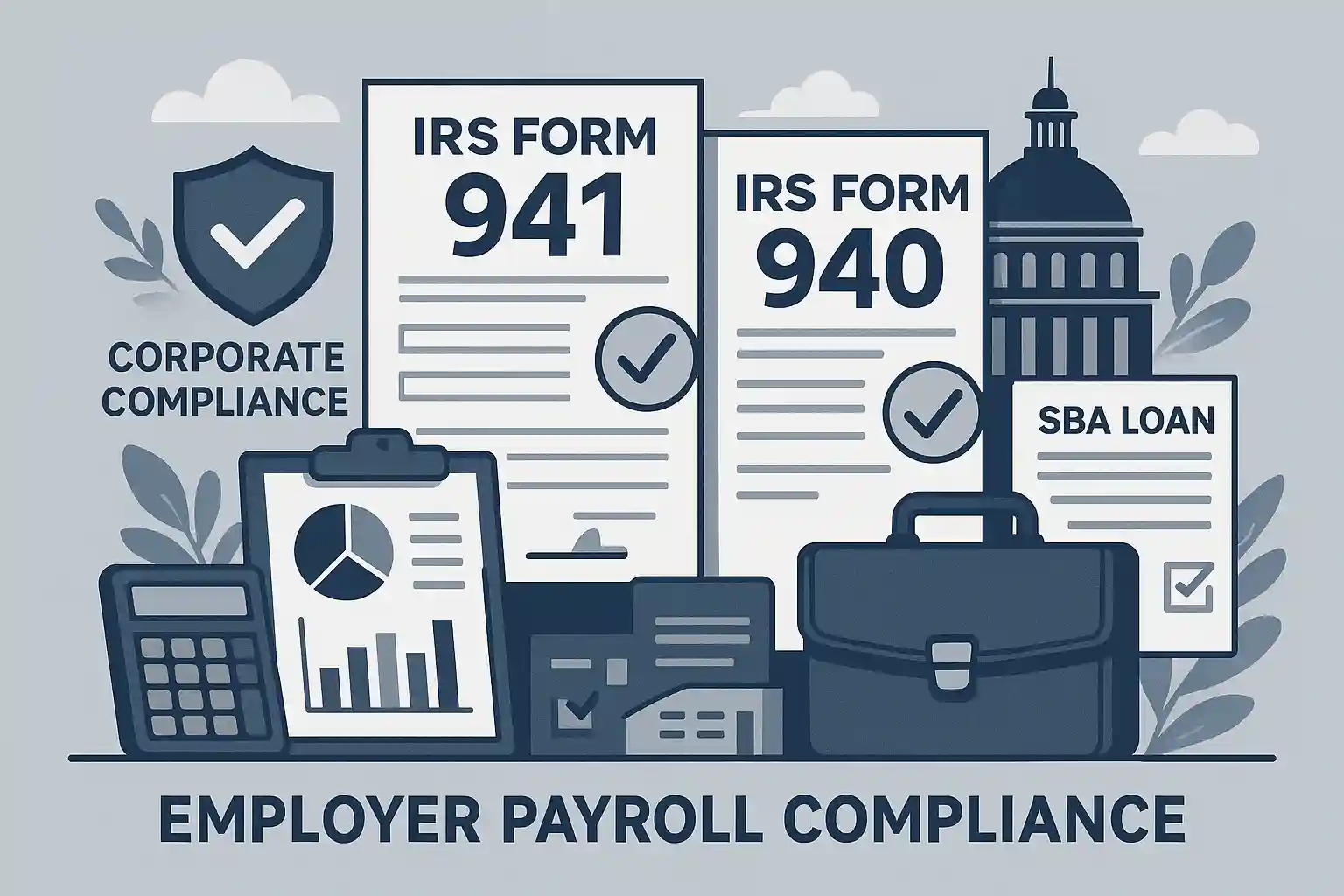
Foreign shareholders who own or have ties to U.S. S-Corporations often face questions about tax compliance, especially when they do not qualify for a Social Security Number (SSN). In these cases, the Internal Revenue Service (IRS) requires the use of an Individual Taxpayer Identification Number (ITIN) to file a federal tax return and meet reporting obligations properly. Understanding how ITINs work is essential for avoiding mistakes and maintaining compliance.
An ITIN is more than just a number; it ensures foreign investors, spouses, dependents, and trust beneficiaries can meet their tax obligations without U.S. work authorization. For S-Corporation owners abroad, this distinction is significant, since S-Corporations have strict eligibility rules and require accurate shareholder reporting. Without the correct ITIN, a shareholder may encounter delays, rejected returns, or even risk penalties.
This guide provides a step-by-step explanation of ITIN requirements for foreign S-Corporation shareholders. It covers who needs an ITIN, the application and renewal process, critical deadlines, and the risks of noncompliance. It also outlines special scenarios and solutions, ensuring readers unfamiliar with U.S. tax law can confidently understand their responsibilities and take the proper steps to stay compliant.
What is a Taxpayer Identification Number (TIN)?
A Taxpayer Identification Number (TIN) is a unique number issued by the Internal Revenue Service (IRS) for tax purposes. It allows the IRS to track and process federal tax returns, payments, and credits. Every taxpayer, whether a U.S. citizen or a foreign national with U.S. tax obligations, must use some form of TIN when filing a federal income tax return or interacting with the IRS.
The IRS issues different types of TINs, depending on a person’s or business’s situation:
- Social Security Number (SSN): Assigned by the Social Security Administration, used primarily by U.S. citizens and authorized residents for work and tax reporting.
- Individual Taxpayer Identification Number (ITIN): A nine-digit number issued by the IRS to individuals who cannot qualify for an SSN but still need to file a federal tax return. This is especially important for foreign shareholders in corporations.
- Employer Identification Number (EIN): Used by businesses, trusts, and estates for tax reporting. An S-Corporation will have an EIN, separate from the individual TINs of its shareholders.
The ITIN plays a critical role for foreign S-Corporation shareholders. While the corporation uses its EIN to file Form 1120-S, each shareholder must provide an SSN or ITIN to report pass-through income on a personal return. Without a valid ITIN, a shareholder cannot file properly, which may cause the IRS to reject the return or delay processing.
Understanding S-Corporations and Foreign Ownership Rules
An S-corporation is a special type of business entity recognized by the Internal Revenue Service (IRS). Unlike a traditional C-corporation, which pays corporate income tax, an S-corporation allows income, deductions, and certain credits to pass directly through to the shareholders’ personal tax returns. This “pass-through” structure prevents double taxation and can benefit small and closely held companies.
However, the IRS sets strict eligibility rules for S S-Corporations. The corporation must be formed in the United States, cannot have more than 100 shareholders, and can only issue one class of stock. Most importantly, ownership is limited to U.S. citizens, lawful permanent residents, and certain qualifying trusts or estates. Nonresident aliens cannot be shareholders of an S-Corporation. If a shareholder becomes a nonresident alien at any point, the S-Corporation automatically loses its S-election and reverts to C-Corporation status, which carries different tax treatment.
Despite these restrictions, TINs—especially ITINs—are still relevant in several scenarios. For example, spouses of U.S. shareholders may need an ITIN to file a joint federal tax return, or dependents may need one to qualify for certain credits. Trust beneficiaries receiving income from S-Corporation stock may also require ITINs for proper reporting. These situations highlight why foreign individuals connected to an S-Corporation must understand ownership rules and TIN requirements to remain compliant.
Why Foreign S-Corporation Owners Need TINs
Foreign individuals connected to an S-Corporation often need an Individual Taxpayer Identification Number (ITIN) to meet their U.S. tax obligations. The IRS uses ITINs to ensure that income earned through a pass-through entity is reported correctly and taxed, even if the individual does not qualify for a Social Security Number (SSN). Without a valid ITIN, a shareholder cannot file a complete federal tax return, which may lead to penalties, processing delays, or lost tax benefits.
One of the most common reasons for needing an ITIN is to report Schedule K-1 income. Each year, an S-Corporation must file Form 1120-S and provide Schedule K-1s to its shareholders, which detail their share of profits or losses. Shareholders lacking an SSN must use an ITIN to include this information on their federal income tax return. This process ensures that the IRS can match corporate filings with individual returns.
Beyond reporting income, ITINs also allow foreign shareholders and their families to claim eligible deductions and credits. For example, a spouse or dependent may need an ITIN to be included on a joint return or to qualify for certain credits. In addition, compliance with ITIN requirements prevents disruptions in tax processing, protects against unnecessary penalties, and helps maintain the shareholder’s good standing with the IRS. For anyone with international ties to an S-Corporation, securing and maintaining an ITIN is essential to tax compliance.
Who Needs a TIN in the S-Corporation Context?
Not everyone tied to an S-Corporation abroad automatically needs an Individual Taxpayer Identification Number (ITIN). The requirement depends on a person’s status and interactions with the corporation. Below are the most common situations where a TIN is necessary.
Foreign Investors and Resident Aliens Without SSNs
Foreign investors who meet the substantial presence test and qualify as resident aliens for tax purposes may need an ITIN if they are not eligible for a Social Security Number.
Example: A foreign investor living in the U.S. under a visa without work authorization receives S-Corporation income. They must apply for an ITIN to report this income on their federal tax return.
Spouses of U.S. Shareholders Filing Jointly
When a U.S. citizen or resident shareholder files a joint return, their spouse must also have a valid TIN, even if the spouse has no U.S. employment authorization.
Example: A shareholder’s spouse who lives abroad without a Social Security Number still needs an ITIN to be included on the joint federal income tax return.
Dependents Claimed for Tax Benefits
Children and other dependents of S-Corporation shareholders who are listed on a return may need ITINs to claim allowable credits.
Example: A dependent child living overseas can be claimed for the Child Tax Credit, but only if they have a valid ITIN issued by the IRS.
Trust Beneficiaries with S-Corporation Stock
Foreign beneficiaries of trusts holding S-Corporation shares may also require ITINs to report distributed income properly.
Example: A Canadian beneficiary receives income from a trust that owns S-Corporation stock. To meet IRS filing requirements, the beneficiary must apply for an ITIN.
These scenarios show that ITIN requirements go beyond direct shareholders. Spouses, dependents, and trust beneficiaries often play a role in U.S. tax compliance and must ensure their documentation is complete.
Timeline and Critical Deadlines
Meeting IRS deadlines is just as crucial as securing an ITIN. Missing a filing date can cause processing delays, penalties, or even the loss of certain credits. Foreign S-corporation shareholders and their families should plan to avoid these complications.
- Form 1120-S Filing: An S-Corporation must file Form 1120-S by the 15th day of the third month after the end of its tax year. For calendar-year corporations, this is March 15. Shareholders then receive Schedule K-1, which reports their share of income.
- Individual Tax Returns: Each shareholder must file a federal income tax return by April 15 (unless they request an extension to October 15). A valid ITIN must be included for the return to be accepted.
- ITIN Application Timing: New ITIN applications should be submitted with the first tax return requiring the number. Processing typically takes seven weeks but may extend to 9–11 weeks during peak season.
- ITIN Renewal: It expires if an ITIN has not been used on a tax return for three consecutive years. Renewals must be completed before filing the next return, or the IRS will reject the filing.
These deadlines overlap with corporate and individual filing responsibilities, making early preparation critical. Shareholders should track S-Corporation and personal filing calendars to ensure all documents are submitted on time and properly processed.
Step-by-Step TIN Application Process
Applying for an Individual Taxpayer Identification Number (ITIN) involves several steps. Following the process carefully helps ensure the IRS accepts the application without delays.
Step 1: Determine Eligibility
Confirm that you do not qualify for a Social Security Number (SSN) but still have a federal tax return requirement. Foreign shareholders, spouses, dependents, and trust beneficiaries often meet these criteria.
Step 2: Gather Required Documents
Applicants must provide proof of both identity and foreign status. The IRS accepts 13 types of documents, but the passport is the only one that serves as a standalone option.
1. Passport
- Proves identity
- Confirms foreign status
- Can be used as a standalone document
2. U.S. State Driver’s License
- Proves identity
- Does not confirm foreign status
- Not accepted as a standalone document
3. Foreign Driver’s License
- Proves identity
- Confirms foreign status
- Not accepted as a standalone document
4. USCIS Photo ID
- Proves identity
- Confirms foreign status
- Not accepted as a standalone document
5. Civil Birth Certificate
- Proves identity
- May confirm foreign status (in limited situations)
- Not accepted as a standalone document
6. Medical Records (for children)
- Proves identity
- May confirm foreign status (in limited situations)
- Not accepted as a standalone document
*Only if foreign-issued
Step 3: Complete IRS Form W-7
Fill out Form W-7, Application for IRS Individual Taxpayer Identification Number. Select the appropriate box that explains your reason for applying, such as “nonresident alien required to file a federal tax return” or “dependent of a U.S. citizen/resident alien.”
Step 4: Attach Supporting Tax Documents
Most ITIN applications must include a completed federal tax return. This typically means attaching Schedule K-1 along with Form 1040 or 1040-NR for S-Corporation shareholders.
Step 5: Submit the Application
Applicants may submit their package in three ways:
- Mail: Send to the IRS ITIN Operations Unit in Austin, TX.
- In Person: Schedule an appointment at an IRS Taxpayer Assistance Center.
- Certified Acceptance Agent (CAA): Work with an authorized agent who can verify documents and forward the application to the IRS.
Submitting a complete application with correct documentation reduces the chance of rejection and speeds up processing.
TIN Renewal Process for Foreign Shareholders
An Individual Taxpayer Identification Number (ITIN) does not last indefinitely. Renewal is required to keep it valid and ensure the IRS accepts your federal tax return. Shareholders abroad should be proactive about this process to avoid filing delays.
When Renewal Is Required
- If an ITIN has not been used on a federal tax return for three consecutive years, it automatically expires.
- ITINs issued before 2013 also require periodic renewal unless already updated.
- Renewal is mandatory before filing any return where the ITIN is needed.
Documents Needed
The documents required for a new ITIN application are also needed for renewal. This includes:
- Form W-7 (marked “Renew Existing ITIN”)
- Proof of identity and foreign status (passport, driver’s license, or other acceptable documents)
- A valid federal tax return, unless an exception applies
Processing Timeline
Renewal applications typically take about seven weeks to process. During peak filing season, expect processing to extend to nine to eleven weeks.
Common Mistakes to Avoid
- Submitting expired or incomplete documentation
- Forgetting to include a required tax return or exception paperwork
- Using an expired ITIN when filing can result in rejected returns or delayed refunds
By renewing early and carefully reviewing documentation, foreign shareholders and their families can ensure compliance and avoid unnecessary tax complications. For official IRS instructions, see How to Renew an ITIN—a reliable guide directly from the IRS.
Certified Acceptance Agents (CAAs) and Their Role
The IRS allows certain professionals and organizations to act as Certified Acceptance Agents (CAAs). These agents simplify the ITIN application process by reviewing original documents, verifying identity and foreign status, and submitting applications directly to the IRS on behalf of taxpayers.
What CAAs Do
CAAs help applicants avoid mailing sensitive original documents such as passports. Instead, they verify the authenticity of the documents and prepare a Certificate of Accuracy, which is submitted along with the Form W-7 application. This service reduces the risk of lost paperwork and speeds up the process.
Benefits for Foreign Shareholders
- Convenience: Documents are returned immediately instead of being held by the IRS.
- Accuracy: Applications are reviewed by trained professionals, lowering the risk of rejection.
- Access: CAAs often provide services in multiple countries, making it easier for overseas applicants to comply with IRS requirements.
Becoming a CAA (For Tax Professionals)
Tax preparers, financial institutions, and other eligible organizations may apply to become CAAs. The process involves:
- Completing IRS training on ITIN rules and document verification.
- Passing a suitability check conducted by the IRS.
- Signing an agreement to follow program standards and maintain accurate records.
For full details, see the official IRS page on the ITIN Acceptance Agent Program. For foreign S-Corporation shareholders, working with a CAA offers peace of mind and a smoother path to securing or renewing an ITIN.
Common Scenarios and Edge Cases
Even when the ITIN rules seem clear, certain real-world situations can create complications for foreign S-Corporation shareholders and their families. The following examples highlight how these cases are typically handled.
Transition from ITIN to SSN
A foreign individual who obtained an ITIN may later qualify for a Social Security Number after gaining work authorization or permanent resident status. In this case, the person must stop using the ITIN and begin filing all federal tax returns under the new SSN. The IRS should be notified to ensure records are updated.
Duplicate TIN Assignments
Occasionally, due to errors or status changes, a person may be issued both an ITIN and an SSN. The IRS requires the ITIN to be deactivated and all future filings to be made under the SSN. Prompt correction prevents mismatched records and potential processing delays.
ITIN Rejection and Resolution
Applications may be rejected if the supporting documents are incomplete, expired, or improperly certified. To correct this, applicants must carefully review the rejection notice, submit missing or updated documentation, and reapply using Form W-7.
Complex Situations
Certain groups face additional challenges:
- Students or researchers receiving income through S-Corporations may need to show visa compliance and provide additional documentation.
- Trust beneficiaries living abroad may need ITINs to report distributed income properly.
- Families with multiple applicants should submit applications together to avoid inconsistencies.
By understanding these edge cases, shareholders can better prepare their applications and avoid unnecessary complications in the ITIN process.
Risks of Ignoring TIN Requirements
Failing to obtain or renew an Individual Taxpayer Identification Number (ITIN) can create serious issues for foreign S-Corporation shareholders and their families. The IRS requires accurate taxpayer identification for all returns, and missing or expired numbers can prevent proper filing.
Filing Delays and Penalties
A federal tax return submitted with an expired or missing ITIN may be rejected. This can result in late filing penalties, loss of certain credits, and delayed refunds. The IRS may also impose interest on unpaid taxes until the return is correctly filed.
Risks to S-Corporation Compliance
If shareholders do not maintain valid TINs, the S-Corporation may face complications when issuing Schedule K-1 forms or reporting pass-through income. Errors in shareholder records increase the risk of IRS scrutiny and may create administrative burdens for the corporation.
Immigration or Residency Complications
In some cases, unresolved tax issues can affect an individual’s immigration status or future applications for residency. Maintaining compliance by keeping ITINs current helps demonstrate good standing with U.S. tax authorities.
By promptly addressing ITIN requirements, shareholders protect themselves and their corporations from unnecessary financial and legal risks.
Practical Next Steps for Shareholders
For foreign S-Corporation shareholders, managing ITIN requirements is about applying once and maintaining compliance over time. Taking a structured approach helps reduce risks and keep tax obligations on track.
Immediate Actions
- Assess your situation: Determine whether you or your family members need an ITIN to meet U.S. tax requirements.
- Gather documentation: Collect passports, driver’s licenses, or other accepted proof of identity and foreign status.
- Choose submission method: You can decide whether to mail the application, use an IRS Taxpayer Assistance Center, or work with a Certified Acceptance Agent.
Medium-Term Planning
- File your application: Submit Form W-7 with the required tax return or exception documentation.
- Track progress: Monitor for IRS correspondence and respond promptly to verification notices.
- Prepare tax filings: Ensure Schedule K-1 income is correctly reported once an ITIN is assigned.
Long-Term Compliance
- Renew on time: Keep track of expiration rules and renew ITINs before they lapse.
- Update records: Notify the IRS if you later qualify for an SSN to deactivate the ITIN.
- Consult professionals: If your situation involves trusts, multiple dependents, or international income, work with tax preparers or CAAs.
By following these steps, shareholders can avoid unnecessary delays, protect their tax benefits, and remain in good standing with the IRS.
Frequently Asked Questions
Can nonresident aliens own S-Corporation stock?
No, nonresident aliens cannot be shareholders in an S-Corporation. The IRS requires all shareholders to be U.S. citizens, lawful permanent residents, or certain qualifying trusts and estates. Suppose a shareholder becomes a nonresident alien during the year. In that case, the S-Corporation automatically loses its S-election and is treated as a C-Corporation for tax purposes, which changes how income is taxed.
Do spouses and dependents of S-Corporation owners need TINs?
Yes, spouses and dependents may need TINs to be included on a federal income tax return or qualify for certain credits. A spouse who files jointly with a shareholder must have a valid TIN. Dependents claimed for tax benefits, such as the Child Tax Credit, must also hold ITINs unless eligible for Social Security Numbers.
How long does it take to get or renew an ITIN?
Processing an ITIN application typically takes seven weeks. It may extend to nine to eleven weeks during peak filing season from mid-January through April. Delays also occur if documents are incomplete or improperly certified. To avoid problems, applicants should gather all required documents, file early, and consider using a Certified Acceptance Agent or an IRS Taxpayer Assistance Center for verification.
What is the difference between Social Security and a Taxpayer Identification Number (ITIN)?
A Social Security Number is issued to U.S. citizens and authorized residents for work and tax reporting. In contrast, the IRS issues a Taxpayer Identification Number ITIN to individuals who cannot obtain an SSN but still must meet U.S. tax obligations. Both serve for tax filing, but only SSNs authorize employment and provide access to Social Security benefits.
How long does an ITIN renewal take?
ITIN renewal usually takes about seven weeks, although during peak filing season, the process may stretch to nine to eleven weeks. To avoid delays, applicants should gather valid identification, complete Form W-7, and apply early. Renewing on time ensures the IRS accepts your federal tax return without issues, preventing rejected filings and delayed refunds that can result from expired ITINs.
Can spouses and dependents apply for an ITIN?
Yes, spouses and dependents may apply for an ITIN if included in a federal tax return. A spouse needs one when filing jointly with a U.S. shareholder with a Social Security Number, while dependents need ITINs to be claimed for certain credits. The IRS requires proper documentation, such as passports or birth certificates, to verify eligibility before issuing an ITIN.
What should I do if the IRS rejects my ITIN application?
If the IRS rejects an ITIN application, review the notice carefully to understand the reasons. Common issues include missing documentation, expired identification, or an incomplete Form W-7. Applicants must correct the errors, provide updated documents, and resubmit the application. Using a Certified Acceptance Agent or visiting an IRS Taxpayer Assistance Center can help reduce errors and improve the likelihood of acceptance on resubmission.




























































%20A%20Complete%20Guide%20for%202025.avif)























